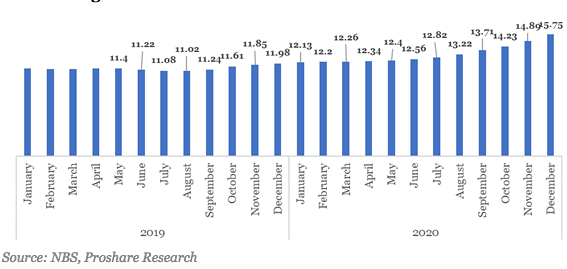 Les actualités de la BRVM en Flux RSS
Les actualités de la BRVM en Flux RSS
Nous agrégeons les sources d’informations financières spécifiques Régionales et Internationales. Info Générale, Economique, Marchés Forex-Comodities- Actions-Obligataires-Taux, Vieille règlementaire etc.
Enjoy a simplified experience
Find all the economic and financial information on our Orishas Direct application to download on Play StoreAfrica's largest economy saw inflation reach 15.75 percent in December, its highest in 33 months, according to figures from the National Bureau of Statistics (NBS). Nigeria, which had closed its borders from August 2019 to December 2020 (the import of rice and certain foodstuffs remains prohibited) to stimulate its food self-sufficiency process is moving a little further away from the convergence criteria for the adoption of the Eco, ECOWAS single currency.
This Olympic inflation, which results in part from the instability of the national currency, the Naira, supported by massive drains on foreign exchange reserves, is felt heavily in the basket of the housewife. Thus, the NBS estimates that food inflation reached 19.56% in December 2020 against 18.30% a month earlier. "This increase in the food index was caused by the increase in the prices of bread and cereals, potatoes, yams and other tubers, meat, fruits, vegetables, fish and oils and fats," the statistics agency reports.
Similarly, core inflation, which excludes changes in food and energy prices, stood at 11.37% in December 2020, up 0.32% from 11.05% in November. The NBS estimated that the highest increases during the month were recorded in the prices of air passenger transport, medical services, hospital services, footwear, road passenger transport, miscellaneous services related to hair salons and personal care facilities.

As Africa's largest economy, Nigeria is estimated to have 87 million poor people. A paradox?
According to observers, this inflation is caused by various factors including, among others, the Covid-19 pandemic that has destructured the country's macroeconomic parameters, the depreciation of the national currency and the closure of borders with neighboring countries. The Lagos Chamber of Commerce and Industry (LCCI) and the Nigerian Industrials Association (MAN) noted in 2020 that the border closure has driven up the prices of inputs and finished goods in Nigeria. "For the year 2021, we expect headline inflation to remain high as the combination of food supply shocks, exchange rate (FX) policies, higher energy costs, currency illiquidity, of increased insecurity in the main food-producing states, will continue to increase pressure on consumer prices in the domestic market," Muda Yusuf, LCCI Director General, was quoted as saying by ICIRI News.
Nigeria has the highest number of poor people in the world, with 87 million living in extreme poverty, according to a 2018 World Poverty Clock report. The unemployment rate reaches 27% according to the NBS. Economic operators believe that one of the measures to reduce inflation would be to increase trade with neighbouring countries. If President Muhammadu Buhari persists in this option restricting trade with neighboring countries, the first half of the year should still see inflation reach new records. "With increases in fuel prices between 25 and 30%, increases in electricity prices between 55 and 65%), the weakness of the currency and the pressure of food prices, overall inflation will reach 16 to 18% in the first half of 2021," says Wale Okurinboye, Head of Investment Research at Sigma Pensions, quoted by nairametrics.com. The country's 2021 budget forecasts that inflation will reach 11.95% in 2021 with an expected GDP growth of 3%.
Vous devez être membre pour ajouter un commentaire.
Vous êtes déjà membre ?
Connectez-vous
Pas encore membre ?
Devenez membre gratuitement
16/06/2025 - Economie/Forex
16/06/2025 - Economie/Forex
13/06/2025 - Economie/Forex
12/06/2025 - Economie/Forex
12/06/2025 - Economie/Forex
11/06/2025 - Economie/Forex
11/06/2025 - Economie/Forex
10/06/2025 - Economie/Forex

16/06/2025 - Economie/Forex

16/06/2025 - Economie/Forex

13/06/2025 - Economie/Forex
